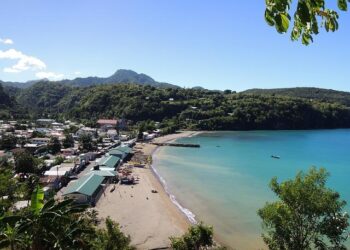Too few people realize the full extent of Iran’s role in backing terrorist groups across the Middle East, from Hamas in Gaza to Hezbollah in Lebanon and the Houthis in Yemen. Even fewer are aware of Iran’s expanding influence in the Western Hemisphere, threatening regional stability and U.S. security at an alarming level.
But we can’t afford to ignore the threat any longer. It’s time for the U.S. to act, forging a comprehensive plan with our allies to preempt Iran’s geopolitical ambitions in our own neighborhood.
It starts with understanding the full scope of the danger, reflected in recent incidents and others dating back decades. It requires effective engagement with like-minded countries — many of which have also recognized Iran and Hezbollah as clear and present threats — through a persistent, long-term strategy that leverages diplomatic, security and financial assets to prevent the Iranian regime from wreaking havoc in our hemisphere.
Since Oct. 7, 2023, when Hamas terrorists massacred 1,200 people in Israel, several terrorist plots linked to Iranian proxies targeting Jewish communities have been thwarted in Brazil and Argentina. The U.S. Treasury Department has sanctioned dozens of individuals in South America for alleged ties to Hezbollah, with the latest sanctions issued in the fall of 2023.
Opinion
Argentina, Brazil and Paraguay have been investigating Hezbollah’s nefarious activities in their joint border area for years. U.S. intelligence agencies have also kept a close watch on this region, scrutinizing the large Lebanese and Syrian immigrant communities for Islamist sympathies. Paraguayan authorities, with U.S. assistance, have repeatedly arrested locals laundering profits from illegal trade that fuels Hezbollah’s activities in Lebanon.
The threat posed by the Iranian regime to the Americas was revealed on July 18, 1994, when a powerful bomb leveled a Jewish community center in Buenos Aires, killing 85 and injuring 300. An investigation concluded in 2007 that Iran, through its proxy Hezbollah, was responsible for this heinous attack.
The Israeli embassy in Buenos Aires had been bombed two years earlier, which claimed 29 lives. Interpol issued “red notices” for five Iranian suspects, some of whom later became government ministers, yet no arrests have ever been made. Several of them continued to visit the region unhindered.
Iran’s increased presence in the region dates back to 2005, when Mahmoud Ahmadinejad became president of Iran and forged a strong alliance with Venezuela’s Hugo Chávez, driven by their shared opposition to what they saw as U.S. hegemony.
Chávez openly backed Iran’s nuclear program and expressed interest in developing Venezuela’s own. By 2008, Israeli sources reported Venezuela was supplying uranium to Iran and confirmed Hezbollah cells were operating in Venezuela. In January 2009, Chávez took it further, announcing he was cutting all ties with Israel, solidifying this dangerous alliance. Since then, Venezuela has been regarded as Iran’s gateway to Latin America.
At one point, Venezuelan passports granted entry to over 130 countries without a visa, including 26 in the European Union. Regular flights between Tehran, Damascus and Caracas raised suspicions of arms and personnel being supplied to the region.
Ongoing tensions in Venezuela have escalated economic hardship and political repression, forcing over 7 million Venezuelans to flee their country. The U.S., among other countries, is feeling the impact, with hundreds of thousands of Venezuelans flooding the southern border, some with suspected ties to terrorist organizations like Hezbollah. The urgent need for immigration reform in Congress is crucial for effectively controlling and monitoring our borders.
Unfortunately, other countries in the region have also expanded Iran’s influence. Brazil remains Iran’s primary trading partner in Latin America and has permitted Iranian warships to dock in Rio de Janeiro.
Last July, the defense ministers of Iran and Bolivia signed an agreement to cooperate on drone technology, aircraft maintenance and cybersecurity. In December, Iran and Cuba vowed to unite against U.S. sanctions, while Nicaragua pushed to expand military cooperation, trade and economic aid as a strategy to combat isolation.
Moreover, Iranian and Hezbollah assets are constantly searching for opportunities to activate dormant cells and survey the terrain for future operations. A chilling example emerged in June 2022, when Argentinian authorities detained a Venezuelan cargo plane previously owned by Mahan Air, an Iranian airline tied to the Quds Force, a branch of the Islamic Revolutionary Guard Corps that is a designated foreign terrorist organization, sidestepping international financial sanctions against both Iran and Venezuela.
The plane, with a large crew of Venezuelan and Iranian citizens, including several with IRGC ties, had flown from Mexico to Paraguay and Uruguay before landing in Buenos Aires. This incident highlights the persistent potential threat Iran poses in the region and the need to strengthen intelligence collaboration to preempt terrorist attacks.
Governments in the Americas must act now to stop this alarming trend. Iran’s expanding influence in Latin America, alongside that of its proxies, poses severe security risks to the U.S. and other nations in the Western Hemisphere. It’s time for all countries in the Americas to heed this warning and take swift, united action before it’s too late.
Dina Siegel Vann is director of the Arthur and Rochelle Belfer Institute for Latino and Latin American Affairs at the American Jewish Committee.
Part of our opinion series The Unraveling of Latin America, this essay warns about the growing influence of Iran in the Western Hemisphere.
We welcome your thoughts in a letter to the editor. See the guidelines and submit your letter here. If you have problems with the form, you can submit via email at [email protected]
Source link : http://www.bing.com/news/apiclick.aspx?ref=FexRss&aid=&tid=67422021d9fe4fd0bd92dc8116e30cce&url=https%3A%2F%2Fwww.dallasnews.com%2Fopinion%2Fcommentary%2F2024%2F11%2F23%2Firans-terrorist-expansion-to-latin-america%2F&c=17371829969423369736&mkt=en-us
Author :
Publish date : 2024-11-23 05:00:00
Copyright for syndicated content belongs to the linked Source.











